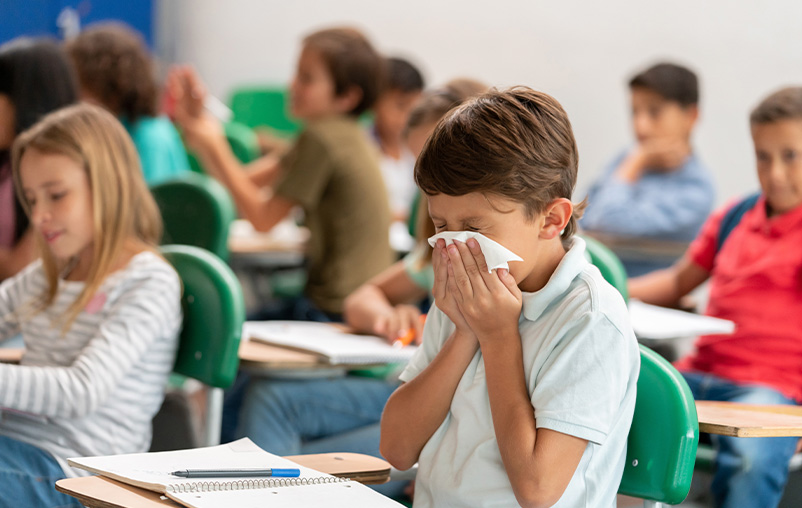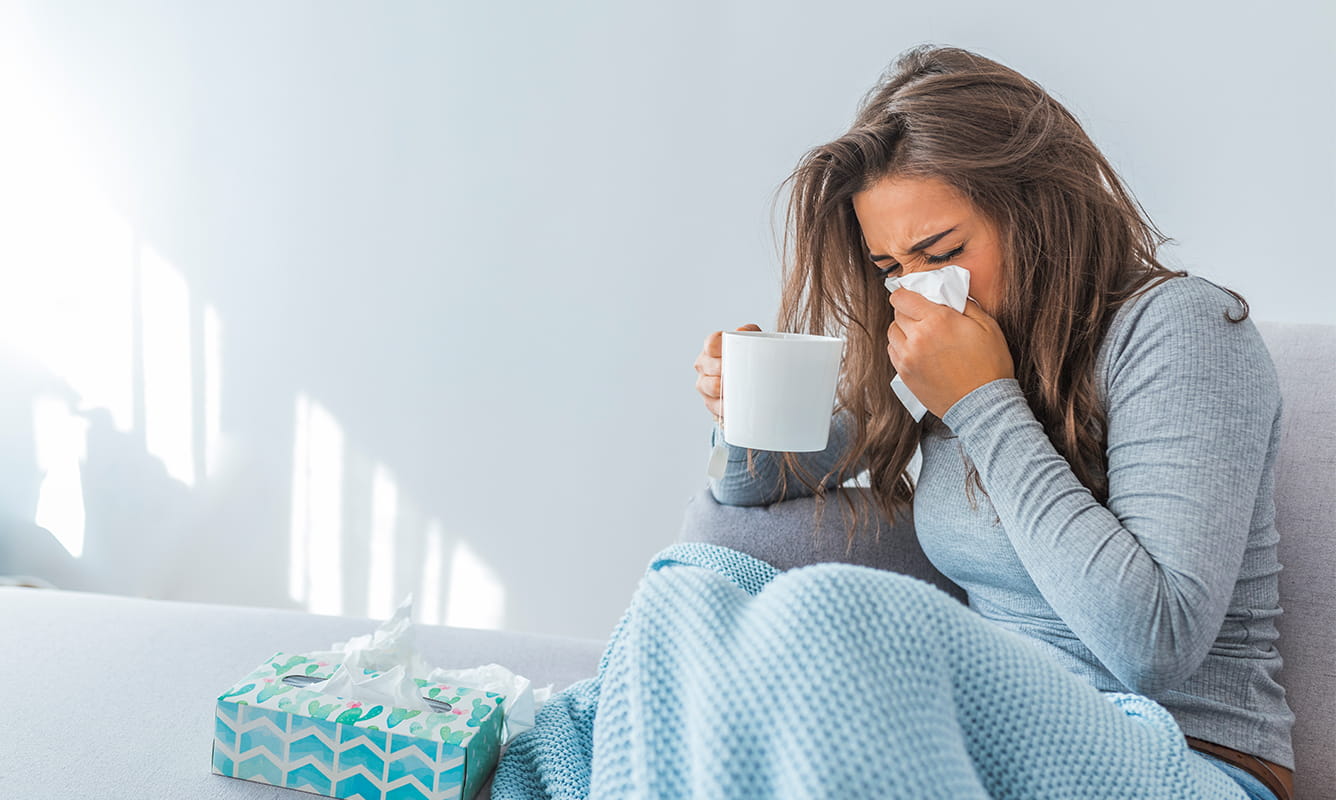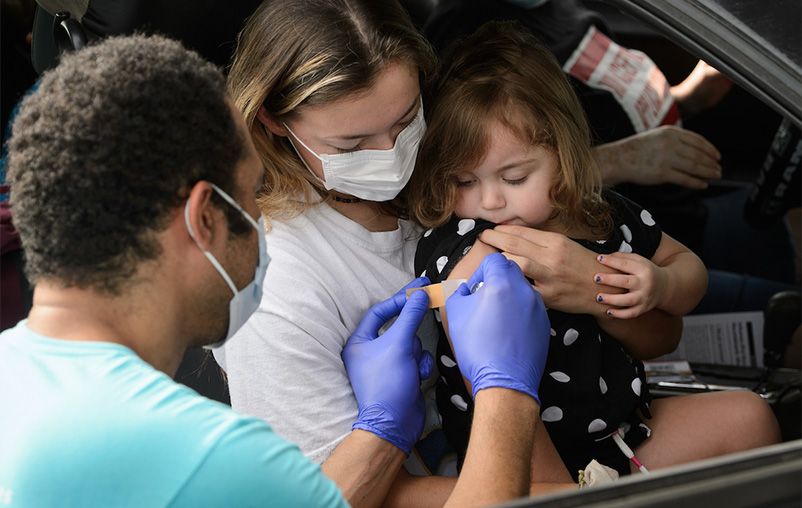If I had COVID-19 already, shouldn’t my antibodies still protect me?
What we’ve learned over the last few months is that people who have had prior infection with COVID-19 and have developed natural immunity antibodies unfortunately are not protected against this new delta variant, which is causing the number of cases that we’re seeing now.
The prior strain was different than this current strain, which is more virulent and transmits more readily. You will not be protected with natural infection alone.
How do I know the vaccine is safe if it got approved so fast?
There’s been a lot of questions about the safety of the vaccines because of the rapid timeline in which they received this emergency use authorization from the FDA. The important thing to recognize is that they still went through the same process of trials and study that other vaccines have in the past. There was some overlapping of the trials to allow some compression of that timeline, but the COVID vaccines have all had to go through phase I, II, and III trials to make sure that they are both safe and effective before they receive this emergency use authorization.
Following that FDA decision, they’re still undergoing analysis, so there’s ongoing study of these vaccines to make sure they are still safe and effective for the people that received them. At this point, we now have data beyond six months for people that received these vaccines in the early trials. The FDA is still continuing to monitor that before they give their full approval, which is expected sometime this month or next.
What do you say to people who say they don’t have time to feel sick after getting vaccinated and will take their chances on catching COVID-19?
I’m always concerned when someone says they’d rather take their chances with COVID-19 than the side effects from the vaccine. The side effects of the vaccine are really well-studied because over 300 million doses have been administered in the United States.
Side effects are generally very, very mild. They occur within the 48 hours of receiving the vaccine, usually more after the second dose than the first dose. They tend to last about 24-25 hours before resolving. Sometimes people have some muscle aches and a little bit of fatigue. Fever is less common. They tend to have some soreness at the injection site, which is a good sign that your immune system is working, but those symptoms go away quickly.
However, infection from COVID-19 can cause a lot of problems. Nobody plans to take the time to spend a week in the hospital for a mild infection, or even longer. If they’re sick enough to end up in the ICU, they could be there for a month. Even if they don’t get admitted to the hospital, they could have symptoms that last for four or five weeks or longer if they develop the long COVID syndrome. Nobody wants to take time for that.
How common is it to feel sick after getting other vaccines, like the measles, mumps, flu, TDap, etc?
People have symptoms from other vaccines that are commonly administered that we’ve been administering for years. Some of these vaccines cause more symptoms than others. We always hear that the flu vaccine can cause muscle aches and arm soreness even in people who get it annually. Again, that tends to be very mild and very short-lived, lasts for about 24 hours, similar to this COVID vaccine.
Pertussis and Tdap vaccines that women are recommended to receive each time they’re pregnant tend to cause more symptoms and more muscle soreness. This COVID-19 vaccine is similar to that to some degree. People tend to have some muscle soreness at the site of injection and other mild symptoms, but they tend to go away pretty quickly.
Are vaccinated people who get COVID-19 just as contagious as unvaccinated people?
We’re still learning about how transmissible a vaccinated person is if they get a breakthrough infection. A breakthrough infection means they’ve received both doses or a full course of the vaccine, and two weeks later they get infected. How transmissible are they to other people?
There was a study that came out relatively recently that shows that infected vaccinated people can have viral loads similar to people who are unvaccinated. But we’re starting to learn that they have a high viral load initially, but for a much shorter period of time. They might have a high viral load similar to someone who’s unvaccinated with COVID-19 infection if they’re unfortunate enough to have a breakthrough infection, but it may only last for two or three days versus the person who’s unvaccinated, where they tend to have a transmissible viral load for up to 10 days, sometimes even longer if they’re immunocompromised.
So it doesn’t look like there’s the same ability to transmit to other people if you’re vaccinated because you have that immune system response. Your antibodies start working on the virus right away. An unvaccinated person who has this unchecked viral load for a longer period of time can potentially infect many more people for a longer period of time.
Why should I get the vaccine if breakthrough cases still happen?
Now that we’re hearing about breakthrough infections, people have raised the question, “Should I still get vaccinated if I can still get infected?” The answer is a resounding yes.
We have a lot of information at this point that backs that up. The rate of hospitalizations and deaths in people who are unvaccinated is much higher. We’re still learning about the impact of transmissibility to others, but it seems that people who are vaccinated probably aren’t as transmissible for as long if they get infected.
Overall, we’re still seeing infections largely in people who are unvaccinated. Breakthrough infections do occur, but compared to unvaccinated people, they’re still very, very rare. There’s a lot of CDC data for the entire 50 states showing that breakthrough infections still occur very rarely.
What are your thoughts about the concern raised about antibody-mediated viral enhancement and that COVID vaccines might make people sicker than they would be with no vaccine?
I think that concern is similar to the questions of are vaccines safe and how did they get approved so quickly. It’s good to ask questions about the vaccines, but it’s important to look at credible sources of information, and it’s important to recognize that these vaccines have still gone through the same scrutiny. To some degree, these COVID-19 vaccines that have received authorization by the FDA in the United States are the most studied vaccines in history at this point, probably.
We also have quite a bit of experience with them. We’ve been giving them for months and months now. We’ve given over 300 million doses. But they all went through phase I, II and III trials. These trials look at how the vaccine works to make sure that we avoid a vaccine that could make people worse rather than better.
Phase II and phase III trials are placebo-controlled trials. That means that people who participated in these studies received either the vaccine or a placebo, and neither the person that received it nor the physician that was monitoring them knew which they received. That way, we can monitor how they respond to the vaccine and if they get infected. That’s a good way to make sure that you’re not having any bias in determining if there are safety or efficacy problems. By using placebo-controlled trials you get a good look at 1. Does the vaccine do what we need it to do, and 2. Is it safe for people to receive?
How does the delta variant affect vaccinated vs. unvaccinated people?
What we know about the delta variant at this point is that it’s the most virulent strain of the SARS-CoV-2 virus (the virus that causes COVID-19) that we’ve seen. A person infected with the prior alpha strain could infect maybe two or three other people. With this delta strain, they can infect seven or eight other people. So that’s two to four times more infectious.
What we see with vaccinated people versus unvaccinated people is that breakthrough infections still can occur but are very rare. When they do occur, people who are vaccinated tend to have very mild illness. They may be asymptomatic and we only detect it when they get tested prior to having a procedure in the hospital. Or they have mild symptoms where they don’t need to be in the hospital or go to the ER or urgent care clinics, which are all full right now.
Unvaccinated people, unfortunately, tend to have more pronounced symptoms, more severe disease. And we’re seeing that based on the numbers of hospitalizations and unfortunately the deaths that we’ve been seeing so far. This big surge in the pandemic is really being driven by people who are unvaccinated.
We have a lot of information at this point that shows that being unvaccinated puts you at high risk not only of getting the disease and transmitting it to other people, but also being hospitalized and potentially dying from COVID-19.
The average age of hospitalized COVID-19 patients is dropping. Does that mean delta is more serious for younger people?
The reason we’re seeing more young people in the hospital with the delta variant than with the prior strains is that the level of vaccination uptake is much better in people who are older. When we look at our patients who are 60 and older, they were the first to be eligible to receive the vaccines, and they’ve also had the biggest uptake since the eligibility criteria have been extended to other age groups.
Those older ages groups are still the highest vaccinated. The delta variant is so transmissible that it’s going through the country pretty quickly, especially through unvaccinated people. But we have many more unvaccinated people, particularly in the 12- to 30-year-old age range. We need to get more people vaccinated. The real reason we’re seeing younger people in the hospital is that more of those people are unvaccinated.
We’re seeing more children hospitalized with COVID-19 now. Is delta more dangerous for them?
The reason we’re seeing more children in the hospital now is that we’re seeing more children get infected. Children under 12 are still not eligible for COVID vaccines at this point, and we’re seeing that this strain of the virus is much more transmissible, so more kids are getting sick.
We also have seen a lot less of the public health measures that we were using initially in the pandemic. Fewer people are masking, more people are getting together, and we’re not doing some of the things that could decrease transmission as well. That leads to more kids getting infected.
Overall, kids have less severe disease than adults. If enough kids get sick, you’re going to have a percentage of them end up in the hospital and unfortunately, some of them are dying.How are the symptoms of the delta variant different from the original virus?
At this point, in our south Texas region, about 98.9% of circulating isolates are delta variant so we’re getting a lot of opportunities to learn more about it. But one of the things we’re seeing with the delta variant is that the incubation time is shorter. So instead of about five to six days from being exposed to getting infected, it’s more like three to five days.
Patients who have the delta variant have a higher viral load initially and it tends to be in the upper respiratory tract, so we’re seeing more nasal congestion early on, which is a pretty mild symptom. But unfortunately, when people are having that mild nasal congestion, they’re already transmissible to others. Early on in the pandemic with the original strain, we were seeing lower respiratory tract types of symptoms like fever, cough and shortness of breath -- symptoms that were a little bit more worrisome. So people sought care earlier.
So one of the concerns with this delta variant is that because people are having milder symptoms like nasal congestion like they may see with seasonal allergies or maybe a common cold, they are less likely to seek care. If you have any acute symptoms, even if they’re mild like nasal congestion, it would really be recommended that you go and get tested to make sure that you don’t have COVID-19.
How can I tell if it’s COVID-19 and not seasonal allergies?
Most people who’ve lived in south Texas long enough tend to have chronic seasonal allergies. Telling the difference between COVID-19 and seasonal allergies is looking at the acuity of the symptoms. So if these are the same symptoms you’ve been having it may be more related to your allergies.
If it’s responding to the antihistamines or the usual medicines that you take for seasonal allergies then it may not be COVID. But if you’re seeing something new, these are warning signs that you might have something different because clinically it can be really difficult to tease out what you have. If there’s any doubt you really should get tested to make sure it’s not Covid-19.
Do masks still protect us from the delta variant?
Masks are still very, very effective, and that’s a really important point. One of the things that kept us safe and protected before we had vaccine available was the use of masks. This delta variant is more transmissible than the prior strains, but it’s still transmitted the same way. It’s still transmitted largely from large droplets and so wearing the mask is a way that you can keep yourself protected even if you’re fully vaccinated.
That’s why you’re seeing more of these recommendations now if you’re going to be in indoor spaces if you’re fully vaccinated or in large groups of people, wearing the mask is an important way to protect yourself from getting these rare breakthrough infections. If you’re unvaccinated, it’s particularly important that you wear a mask when you’re around people because you’re putting yourself at risk if you’re not using some form of protection. The masks are still highly effective.




